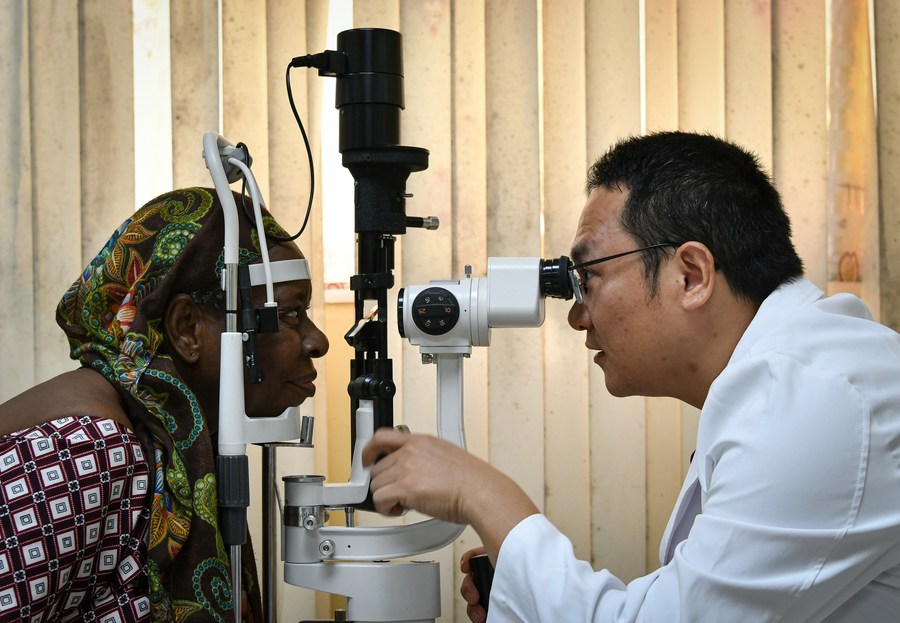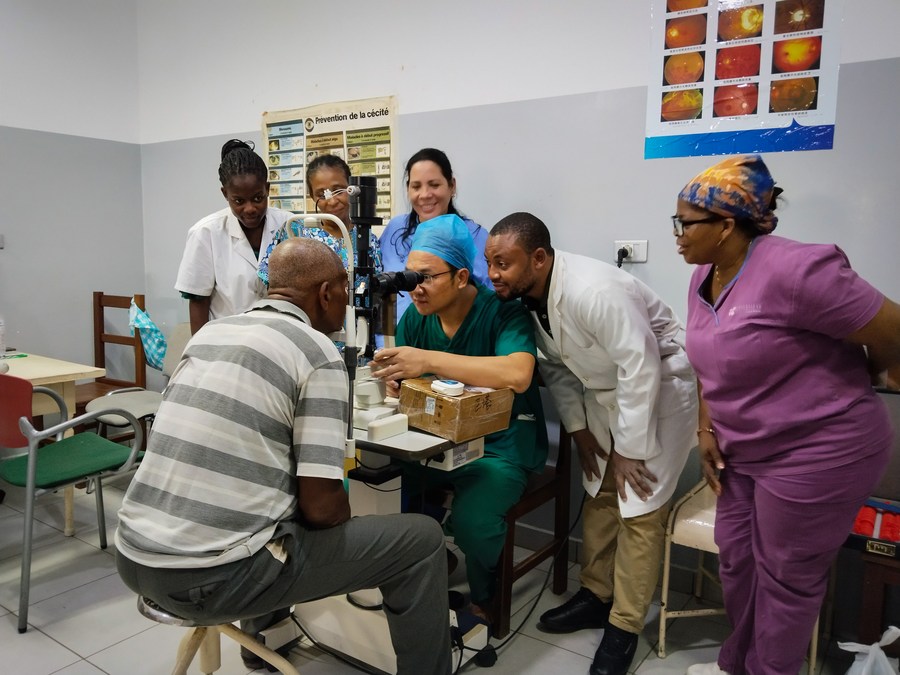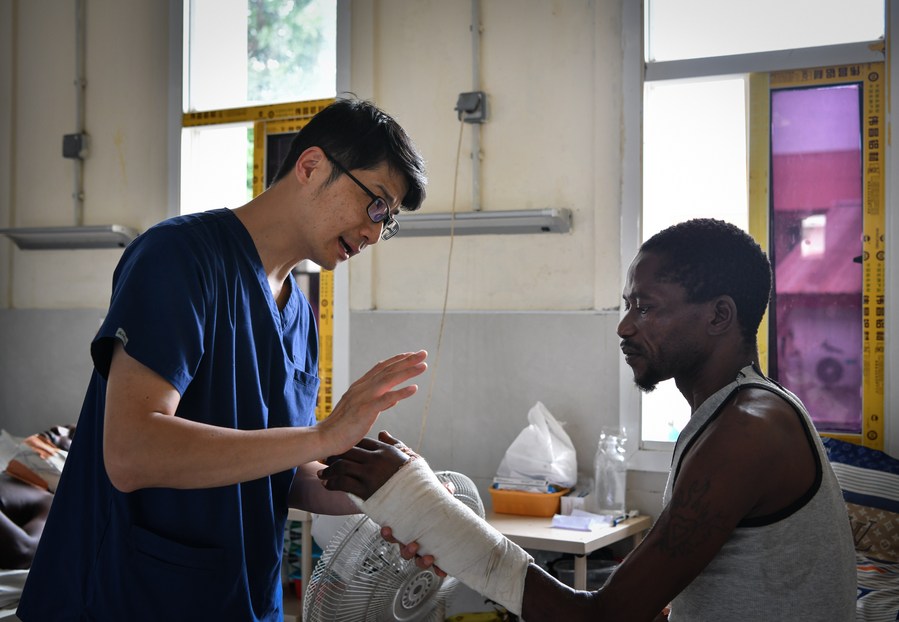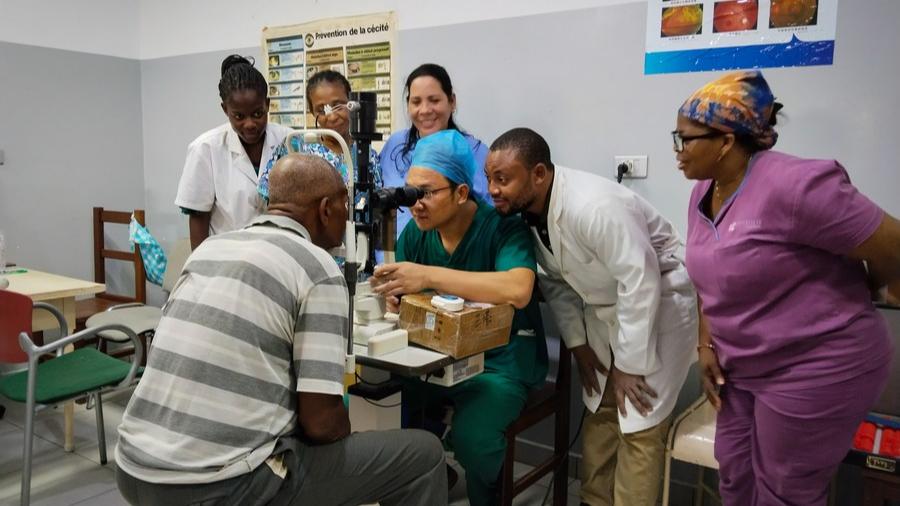
Xie Hongbin (R), an ophthalmologist of the Chinese medical team, examines a patient's eyes at Malabo Regional Hospital in Malabo, Equatorial Guinea, on May 16, 2024. (Xinhua/Han Xu)
"It is truly miraculous, I can see again!" said Pedro Bena, a 78-year-old cataract patient from Equatorial Guinea.
MALABO, May 30 (Xinhua) -- "It is truly miraculous, I can see again!" said Pedro Bena, a 78-year-old cataract patient from Equatorial Guinea.
Surrounded by his jubilant family at the Regional Hospital of Malabo, Pedro expressed deep gratitude for the surgery performed by Chinese doctors, particularly ophthalmologist Xie Hongbin.
Xie is a member of the 33rd batch of the Chinese medical team in the Central African country. Since arriving over a year ago, he has performed 69 cataract surgeries, helping many regain their vision and allowing some families to have their primary breadwinners return to work.
"With the necessary equipment, we can assist even more people in restoring their vision," Xie told Xinhua.
Since 1971, over 600 Chinese medical professionals have been sent in 33 batches to work in the cities of Malabo and Bata in Equatorial Guinea.
The cataract treatments conducted by Chinese doctors in Equatorial Guinea are part of the "Bright Journey" project, Xie said. For years, Chinese doctors have been assisting in these surgeries, bringing in the necessary equipment.

Xie Hongbin (3rd R), an ophthalmologist of the Chinese medical team, leads his Cuban and Equatoguinean colleagues to check the recovery of a patient's eyes after surgery at Malabo Regional Hospital in Malabo, Equatorial Guinea, on May 15, 2024. (The 33rd batch of Chinese medical team to Equatorial Guinea/Handout via Xinhua)
Beside the operating theater at the Regional Hospital of Malabo, 30-year-old local anesthetist Diosdado Batapa was studying under the guidance of Chen Zhicong, an anesthesiologist from the Chinese medical team.
"Dr. Lucas (Chen Zhicong) emphasizes attention to detail, which greatly aids in learning anesthesia techniques and more," Batapa said.
Pergentino Obono, another anesthetist at the Regional Hospital of Malabo, said that the team's kindness is evident in their willingness to help with the most challenging cases.
"Local doctors have been impressed by the techniques introduced by the Chinese medical team," he said.
The compassion and expertise of the Chinese medical team have earned recognition and praise from the government and people of Equatorial Guinea over the years.
In October 2021, President Teodoro Obiang Nguema Mbasogo thanked the Chinese government in a video message, expressing gratitude for the medical teams' dedication and outstanding work.
These days, long lines of patients would wait outside the Chinese medical team's consultation rooms at the Regional Hospital of Malabo.

Fang Ming (L), an orthopedist of the Chinese medical team, talks with a patient at Malabo Regional Hospital in Malabo, Equatorial Guinea, on May 16, 2024. (Xinhua/Han Xu)
The hospital's technical director, Reynolds Ondoua Trillo, said this year, procedures like laparoscopic surgery and acupuncture introduced by the Chinese team have greatly benefited patients in the country.
Over a month ago, Benjamin, suffering from an incarcerated hernia and facing unbearable pain as he prepared for an entrance exam, came to the Malabo hospital to seek help from Chinese doctors.
However, the bill of 200,000 Central African francs (about 330 U.S. dollars) left his father, Juan, in a dilemma. Upon hearing of their conundrum, Liu Anwen, a surgeon from the Chinese medical team, and his colleagues covered Benjamin's expenses out of their own pockets.
Following a laparoscopic surgery, Benjamin was discharged the next day and took his entrance exam a few days later.
During a follow-up visit, Benjamin told Liu, "When I grow up, I want to become a doctor like you and save lives."




 A single purchase
A single purchase









